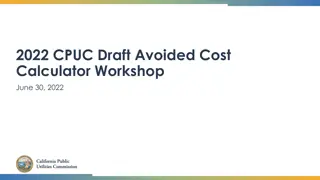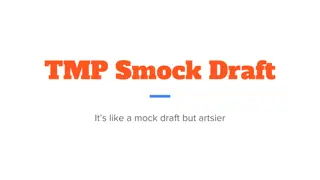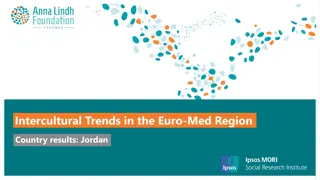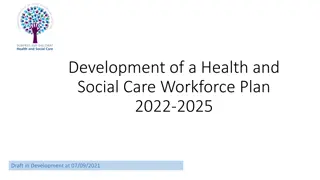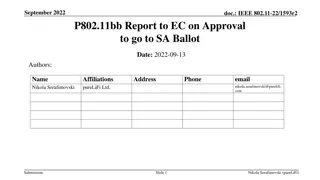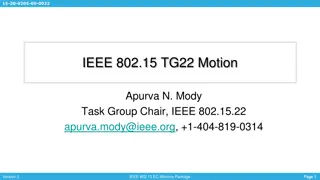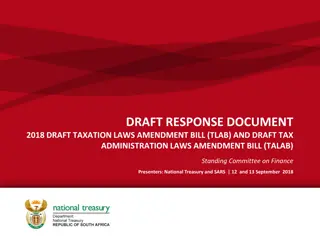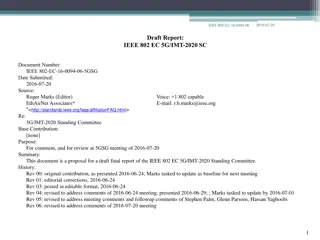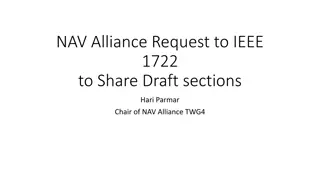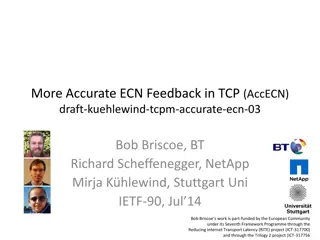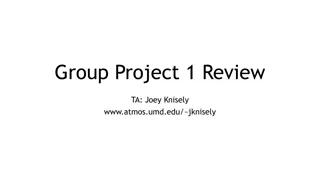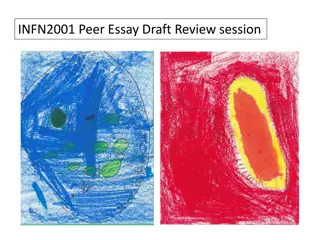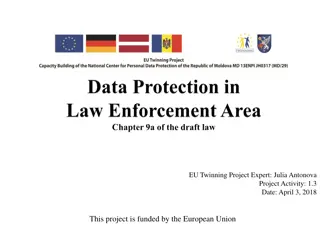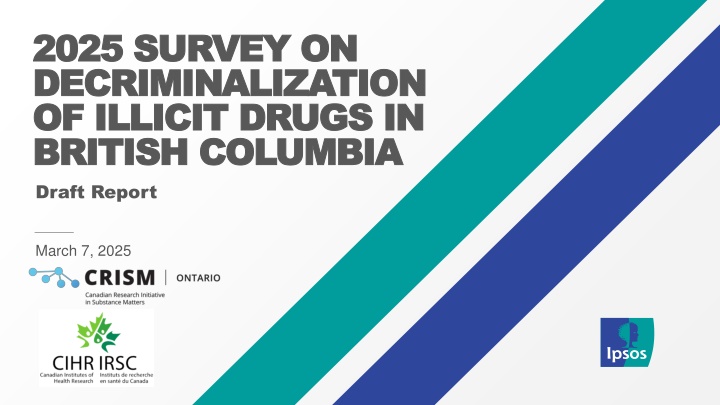
Survey Findings on Decriminalization of Illicit Drugs in British Columbia 2025
"Discover insights from a survey conducted in British Columbia regarding the decriminalization of illicit drugs, aiming to understand public perceptions and opinions towards this policy change. Explore the methodology, consent text, and background information related to this important study."
Download Presentation

Please find below an Image/Link to download the presentation.
The content on the website is provided AS IS for your information and personal use only. It may not be sold, licensed, or shared on other websites without obtaining consent from the author. If you encounter any issues during the download, it is possible that the publisher has removed the file from their server.
You are allowed to download the files provided on this website for personal or commercial use, subject to the condition that they are used lawfully. All files are the property of their respective owners.
The content on the website is provided AS IS for your information and personal use only. It may not be sold, licensed, or shared on other websites without obtaining consent from the author.
E N D
Presentation Transcript
2025 SURVEY ON 2025 SURVEY ON DECRIMINALIZATION DECRIMINALIZATION OF ILLICIT DRUGS IN OF ILLICIT DRUGS IN BRITISH COLUMBIA BRITISH COLUMBIA Draft Report March 7, 2025
Methodology This report presents the results of an online survey conducted on behalf of The Centre for Addiction and Mental Health (CAMH). The survey includes 1,200 adult (18+) British Columbians and was fielded February 12 to February 18, 2025. This is the second wave of fielding on this project. A substantially different baseline survey was fielded March 26 to April 1, 2024. Data has been weighted to reflect the British Columbia population age 18+ based on Census data for region, age, gender and education. The precision of Ipsos polls containing online data is measured using a credibility interval. In this case, the overall poll is accurate to within +/-3.3 percentage points, 19 times out of 20, had all British Columbia adults been polled. The credibility interval will be wider among subsets of the population. All sample surveys and polls may be subject to other sources of error, including, but not limited to coverage error, and measurement error. Due to rounding, not all charts and tables in this report will add to exactly 100% and not all summary statistics will be exactly equal to the sum of their component parts. Any statistical testing in this report is done at the 5% level. 2
Consent Text at Introduction The following questions are being asked on behalf of the Ontario Node of the Canadian Research Initiative in Substance Matters (CRISM), based out of the Centre for Addiction and Mental Health (CAMH). These questions aim to explore the general public s perceptions of the decriminalization of illicit drugs in British Columbia. Questions will ask about your familiarity of the policy, political orientation, level of support or opposition to the policy, perceptions of community safety, and opinions on how the policy may affect various factors. It is your choice whether you decide to answer these questions or not. While the research team doesn t expect significant physical or mental risks associated with study participation, some participants may be reluctant to describe their perspectives. You do not have to answer any questions you do not feel comfortable with. The information learned may help inform public health policy making regarding the decriminalization of illicit substances. If you have questions about this study, you can talk to the researcher who is in charge of the study at CAMH: Cayley Russell (Email: OCRINTProject@camh.ca). If you have questions about your rights as a participant or about ethical aspects of this study, you can talk to the CAMH Chair of the Research Ethics Board (REB) at 416- 535-8501 ext. 36798. 3
Background Text at Introduction On January 31, 2023, the province of British Columbia launched a three-year drug decriminalization initiative which allows adults aged 18+ to legally possess up to a cumulative total of 2.5 grams of opioids, cocaine/crack-cocaine, methamphetamine, and MDMA for personal use. Amounts exceeding 2.5 grams remain criminalized. The BC government s goals of decriminalization are to reduce the harms associated with substance use, including stigma and criminalization, as well as to support people who use drugs (PWUD) to access health and social services, ultimately redirecting them away from the criminal justice system. 4
1 DETAILED DETAILED RESULTS RESULTS
Familiarity with BCs Policy on Decriminalization A slight majority (56%) of British Columbians say they are at least somewhat familiar with BC's policy on the decriminalization of illicit drugs. Roughly nine- in-ten (89%) have at least heard of the policy. I m very familiar with it 16% Familiar 56% Aware 89% I m somewhat familiar with it 39% I ve heard of it, but I don t know much 33% I ve never heard of it 7% Not sure 4% Prefer not to answer <1% Q1. Base: All respondents (n=1,200) How familiar are you with BC's policy on the decriminalization of illicit drugs? 6
Familiarity with BCs Policy on Decriminalization by Demos Familiarity with the decriminalization policy is higher among men, millennials and white British Columbians. Region Sex Age Education Some PostSec 507 Race Van CoastalFraser 240 Female Gen ZMillenn HS or Less 282 Univ Grad 411 Non- White 289 Island Interior North Male Gen X Boomer White Total ial 373 Sample Size 1,200 426 214 194 53 555 630 147 317 363 776 16% 18% 17% 18% 15% 6% 22% 11% 16% 23% 19% 9% 15% 16% 19% 17% 13% I m very familiar with it 39% 36% 40% 39% 45% 41% 42% 37% 35% 39% 38% 43% 37% 43% 39% 43% 31% I m somewhat familiar with it 33% 33% 31% 36% 34% 45% 28% 37% 31% 27% 32% 40% 33% 33% 33% 33% 36% I ve heard of it, but I don t know much 7% 10% 8% 4% 3% 2% 5% 10% 9% 7% 6% 8% 9% 5% 6% 5% 13% I ve never heard of it 4% 3% 3% 3% 3% 5% 3% 5% 8% 3% 5% 1% 5% 3% 2% 3% 7% Not sure 56% 54% 57% 56% 60% 48% 64% 49% 51% 62% 57% 51% 52% 59% 58% 60% 44% Familiar 89% 87% 89% 92% 94% 93% 92% 86% 82% 89% 89% 91% 85% 92% 92% 93% 80% Aware Statistically higher Statistically lower Q1. Base: All respondents (n=1,200) How familiar are you with BC's policy on the decriminalization of illicit drugs? 7
Sources of Information Television or radio news (51%) is the number one source of information about the decriminalization of drugs in British Columbia. Other leading sources include news websites or online news articles (38%), conversations with friends, family, or colleagues (31%) and social media platforms (27%). Television or radio news 51% News websites or online news articles 38% Conversations with friends, family, or colleagues 31% Social media platforms (e.g., Facebook, Twitter, Instagram) 27% Government websites or official announcements 18% Community organizations or advocacy groups 10% Public events, workshops, or town halls 6% Academic or research publications 6% Newspaper* 1% Other 1% I haven't received any information about this topic 9% Not sure 4% Prefer not to answer 1% * added from other specify responses Q2. Base: All respondents (n=1,200) Where have you primarily received information about the decriminalization of drugs in British Columbia? (Select all that apply) 8
Sources of Information by Demos Boomers are much more likely than any other generation to get their information from television or radio news. Region Sex Age Education Some PostSec 507 Race Van CoastalFraser 240 Female Gen ZMillenn HS or Less 282 Univ Grad 411 Non- White 289 Island Interior North Male Gen X Boomer White Total ial 373 Sample Size 1,200 426 214 194 53 555 630 147 317 363 776 51% 46% 54% 51% 59% 47% 53% 50% 32% 33% 52% 73% 48% 57% 50% 55% 43% Television or radio news 38% 35% 37% 46% 45% 22% 41% 34% 28% 35% 43% 40% 31% 41% 45% 41% 31% News websites or online news articles Conversations with friends, family, or colleagues Social media platforms (e.g., Facebook, Twitter, Instagram) Government websites or official announcements Community organizations or advocacy groups 31% 31% 29% 32% 29% 38% 30% 31% 37% 40% 34% 18% 30% 30% 33% 30% 28% 27% 28% 28% 22% 25% 35% 28% 26% 43% 39% 29% 9% 28% 26% 26% 24% 30% 18% 21% 18% 19% 18% 14% 21% 15% 26% 23% 16% 12% 12% 20% 24% 18% 21% 10% 11% 10% 9% 10% 13% 10% 10% 12% 16% 10% 4% 10% 10% 11% 9% 9% 6% 7% 7% 3% 4% 6% 6% 5% 14% 9% 4% 1% 4% 6% 7% 4% 9% Public events, workshops, or town halls 6% 6% 7% 4% 4% 4% 7% 6% 19% 10% 4% 1% 5% 7% 7% 5% 10% Academic or research publications 4% 3% 3% 4% 4% 3% 5% 3% 3% 5% 5% 3% 5% 3% 3% 3% 5% Not sure I haven't received any information about this topic 9% 11% 11% 7% 7% 8% 5% 14% 10% 9% 10% 10% 13% 8% 6% 8% 14% Statistically higher Statistically lower Q2. Base: All respondents (n=1,200) Where have you primarily received information about the decriminalization of drugs in British Columbia? (Select all that apply) 9
Support for Approaches to Addressing Drug Use Among three approaches to addressing drug use among people who use drugs, British Columbians are most supportive (69% support) of focusing on treatment as a public health issue. About half (46%) of residents say they support focusing on treating drugs as a criminal issue, while nearly four-in-ten (38%) support treating drug use with alternate approaches. Total Support Total Oppose Focus on treating drug use as a public health issue (e.g., access to health and social services such as harm reduction, drug treatment, 69% 12% 27% 42% 14% 7% 5% 4% and recovery programs) Focus on treating drug use as a criminal issue (e.g., police enforcement, criminal charges, jail time) 19% 27% 24% 14% 11% 5% 46% 25% Focus on treating drug use with alternate approaches (e.g., 13% 25% 23% 17% 16% 6% 38% 33% regulation, legalization) Strongly support Support Neither Oppose Strongly oppose Not sure Prefer not to answer Q3. Base: All respondents (n=1,200) Please indicate your level of support for each of the following approaches to addressing drug use among people who use drugs (PWUD). 10
Support for Approaches to Addressing Drug Use by Demos Support for the three tested approaches to addressing drug use is mostly consistent across regions and demographics. Treating drug use as a public health issue is the most supported option for all segments. Total Support Region Sex Age Education Some PostSec 507 Race Van CoastalFraser 240 Female Gen ZMillenn HS or Less 282 Univ Grad 411 Non- White 289 Island Interior North Male Gen X Boomer White Total ial 373 Sample Size 1,200 426 214 194 53 555 630 147 317 363 776 Focus on treating drug use as a public health issue (e.g., access to health and social services such as harm reduction, drug treatment, and recovery programs) Focus on treating drug use as a criminal issue (e.g., police enforcement, criminal charges, jail time) Focus on treating drug use with alternate approaches (e.g., regulation, legalization) 69% 68% 70% 73% 68% 73% 66% 72% 59% 69% 73% 70% 68% 68% 70% 70% 65% 46% 45% 51% 39% 49% 34% 49% 44% 49% 44% 51% 43% 46% 46% 46% 45% 55% 38% 47% 41% 34% 31% 29% 39% 37% 43% 48% 35% 30% 35% 36% 44% 35% 41% Statistically higher Statistically lower Q3. Base: All respondents (n=1,200) Please indicate your level of support for each of the following approaches to addressing drug use among people who use drugs (PWUD). 11
Agreement Politics Impacts Personal Support for Decriminalization Policy Fewer than three-in-ten (27%) BC residents agree that politics, political ideologies, or politically-driven decisions influence their level of support for the decriminalization policy. A similar proportion (31%) disagree that politics has an influence, while one-third (34%) are neutral. Strongly agree 8% Agree 27% Agree 19% Neither agree/disagree (Neutral) 34% Disagree 17% Disagree 31% Strongly disagree 14% Not sure 7% Prefer not to answer 1% To what extent do you agree or disagree that politics, political ideologies, or politically-driven decisions influence your level of support for the decriminalization policy? Base: All respondents (n=1,200) Q4. 12
Agreement Politics Impacts Personal Support for Decriminalization Policy by Demos The influence of politics on support for decriminalization is higher among younger residents, non-white residents, university graduates, men and residents of the Fraser health region. Region Sex Age Education Some PostSec 507 Race Van CoastalFraser 240 Female Gen ZMillenn HS or Less 282 Univ Grad 411 Non- White 289 Island Interior North Male Gen X Boomer White Total ial 373 Sample Size 1,200 426 214 194 53 555 630 147 317 363 776 8% 8% 8% 8% 10% 9% 10% 6% 9% 13% 7% 5% 7% 8% 10% 7% 11% Strongly agree 19% 23% 23% 12% 15% 13% 22% 16% 31% 19% 15% 17% 16% 16% 26% 16% 26% Agree 34% 35% 33% 37% 31% 36% 30% 38% 41% 36% 34% 31% 38% 31% 33% 33% 38% Neither agree or disagree (neutral) 17% 14% 17% 20% 17% 14% 15% 19% 5% 11% 21% 23% 15% 22% 14% 19% 10% Disagree 14% 12% 14% 14% 22% 12% 16% 12% 4% 13% 15% 19% 15% 15% 12% 17% 6% Strongly disagree 7% 7% 5% 8% 4% 13% 6% 8% 9% 7% 8% 5% 7% 7% 5% 6% 7% Not sure 27% 31% 31% 20% 25% 21% 32% 23% 39% 32% 23% 22% 24% 24% 36% 23% 37% Agree 31% 26% 31% 34% 39% 26% 31% 31% 9% 24% 35% 42% 29% 37% 26% 36% 16% Disagree Statistically higher Statistically lower To what extent do you agree or disagree that politics, political ideologies, or politically-driven decisions influence your level of support for the decriminalization policy? Base: All respondents (n=1,200) Q4. 13
Agree/Disagree Statements About Impact of Decriminalization (slide 1 of 2) A slim majority (51%) of BC residents agree that decriminalization has encouraged/increased drug use experimentation. Residents are more split as to whether decriminalization has reduced the criminalization of people who use drugs in BC (39% agree, 28% disagree), has improved access to treatment and supports for people who use drugs (27% agree, 41% disagree) or has reduced policing and law enforcement costs and resources (25% agree, 41% disagree). Total Agree Total Disagree Decriminalization has encouraged/increased drug use 51% 17% 21% 30% 21% 11% 6% 10% experimentation Decriminalization has reduced the criminalization of people who 39% 28% 8% 31% 22% 13% 15% 11% use drugs in BC Decriminalization has improved access to treatment and supports 27% 41% 7% 20% 22% 20% 21% 9% for people who use drugs Decriminalization has reduced policing and law enforcement costs 25% 41% 6% 20% 22% 19% 21% 12% and resources Strongly agree Agree Neither Disagree Strongly disagree Not sure Prefer not to answer Q5. Base: All respondents (n=1,200) Please indicate your level of agreement or disagreement with the following statements regarding the impact of decriminalization of illegal drugs in BC. 14
Agree/Disagree Statements About Impact of Decriminalization (slide 2 of 2) Slim majorities of British Columbians disagree that decriminalization has reduced the stigma associated with drug use (55%), has reduced drug-related crimes in their community (55%), has reduced rates of drug overdoses (53%) or has positively influenced their views of people who use drugs (52%). Total Agree Total Disagree Decriminalization has reduced the stigma associated with drug 20% 55% 4% 16% 18% 29% 26% 6% use 16% 53% Decriminalization has reduced rates of drug overdoses 4% 12% 18% 23% 31% 11% Decriminalization has reduced drug-related crimes in my 15% 55% 4% 11% 19% 20% 35% 11% community Decriminalization has positively influenced my views of people 14% 52% 4% 10% 27% 23% 29% 6% who use drugs* Strongly agree Agree Neither Disagree Strongly disagree Not sure Prefer not to answer * In 2024, agreement was 16% and disagreement was 52%. The 2024 and 2025 results are statistically consistent. Q5. Base: All respondents (n=1,200) Please indicate your level of agreement or disagreement with the following statements regarding the impact of decriminalization of illegal drugs in BC. 15
Agree/Disagree Statements About Impact of Decriminalization by Demos Agreement that decriminalization has had positive impacts tends to be higher among younger residents, men and non-white residents. Total Agree Region Sex Age Education Some PostSec 507 Race Van CoastalFraser 240 Female Gen ZMillenn HS or Less 282 Univ Grad 411 Non- White 289 Island Interior North Male Gen X Boomer White Total ial 373 Sample Size 1,200 426 214 194 53 555 630 147 317 363 776 Decriminalization has encouraged/increased drug use experimentation Decriminalization has reduced the criminalization of people who use drugs in BC Decriminalization has improved access to treatment and supports for people who use drugs Decriminalization has reduced policing and law enforcement costs and resources Decriminalization has reduced the stigma associated with drug use Decriminalization has reduced rates of drug overdoses Decriminalization has reduced drug- related crimes in my community Decriminalization has positively influenced my views of people who use drugs 51% 47% 52% 52% 56% 48% 54% 49% 50% 50% 52% 51% 54% 51% 47% 52% 53% 39% 43% 37% 39% 43% 29% 43% 36% 40% 43% 36% 38% 34% 40% 45% 39% 41% 27% 30% 28% 27% 20% 23% 32% 23% 40% 35% 22% 18% 23% 28% 32% 23% 36% 25% 29% 25% 25% 22% 18% 30% 21% 39% 33% 21% 16% 23% 26% 28% 22% 34% 20% 29% 19% 18% 17% 13% 23% 18% 26% 26% 17% 15% 18% 16% 27% 16% 30% 16% 18% 18% 18% 12% 8% 20% 13% 21% 24% 13% 10% 16% 15% 20% 13% 23% 15% 19% 16% 14% 9% 6% 18% 11% 24% 21% 11% 8% 12% 15% 18% 10% 25% 14% 17% 14% 10% 10% 8% 16% 12% 22% 21% 10% 8% 12% 14% 16% 11% 22% Statistically higher Statistically lower Q5. Base: All respondents (n=1,200) Please indicate your level of agreement or disagreement with the following statements regarding the impact of decriminalization of illegal drugs in BC. 16
Agreement I support the decriminalization of illicit drugs policy in BC Nearly three-in-ten (28%) British Columbians agree that they support the decriminalization of illicit drugs policy in BC. Nearly half (47%) disagree they support the policy, while two-in-ten (19%) are neutral. Strongly agree 10% Agree 28% Agree 18% In 2024, agreement was 33% and disagreement was 41%. Both changes from 2024 to 2025 are statistically significant. Neither agree/disagree (Neutral) 19% Disagree 17% Disagree 47% Strongly disagree 30% Not sure 5% Prefer not to answer 1% Q6a. Please indicate your level of support for the following statements: I support the decriminalization of illicit drugs policy in BC Base: All respondents (n=1,200) 17
Agreement I support the decriminalization of illicit drugs policy in BC by Demos Younger residents (Gen Z and Millennials) are the only segments more likely to agree than disagree that they support the decriminalization of illicit drugs policy in BC. Region Sex Age Education Some PostSec 507 Race Van CoastalFraser 240 Female Gen ZMillenn HS or Less 282 Univ Grad 411 Non- White 289 Island Interior North Male Gen X Boomer White Total ial 373 Sample Size 1,200 426 214 194 53 555 630 147 317 363 776 10% 12% 9% 13% 9% 10% 12% 8% 13% 17% 9% 4% 8% 11% 10% 9% 10% Strongly agree 18% 23% 17% 17% 13% 14% 21% 15% 24% 22% 16% 13% 16% 18% 21% 16% 21% Agree 19% 22% 20% 18% 16% 13% 16% 21% 28% 23% 16% 15% 21% 18% 18% 17% 26% Neither agree or disagree (neutral) 17% 13% 18% 22% 15% 19% 14% 20% 14% 10% 20% 22% 16% 18% 18% 19% 15% Disagree 30% 23% 32% 26% 42% 34% 33% 28% 13% 22% 34% 40% 31% 31% 27% 34% 22% Strongly disagree 5% 6% 4% 5% 5% 8% 3% 7% 5% 4% 5% 6% 7% 3% 5% 5% 5% Not sure 28% 35% 26% 29% 22% 23% 33% 23% 36% 39% 26% 17% 24% 29% 32% 25% 32% Agree 47% 36% 50% 48% 56% 53% 47% 47% 27% 32% 53% 62% 47% 49% 45% 53% 37% Disagree Statistically higher Statistically lower Q6a. Please indicate your level of support for the following statements: I support the decriminalization of illicit drugs policy in BC Base: All respondents (n=1,200) 18
Agreement Decriminalization has made me feel less safe in my community Almost half (47%) of BC residents agree that decriminalization has made them feel less safe in their community. Only about two-in-ten (22%) disagree they feel less safe, while one-quarter (26%) are neutral. Strongly agree 22% Agree 47% Agree 25% In 2024, agreement was 43% and disagreement was 28%. The 2024 to 2025 increase in disagreement is statistically significant. The change in agreement is not statistically significant. Neither agree/disagree (Neutral) 26% Disagree 13% Disagree 22% Strongly disagree 10% Not sure 3% Prefer not to answer 1% Q6b. Please indicate your level of support for the following statements: Decriminalization has made me feel less safe in my community Base: All respondents (n=1,200) 19
Agreement Decriminalization has made me feel less safe in my community by Demos Interior health region residents are the most likely to agree that decriminalization has made them feel less safe in their community. Region Sex Age Education Some PostSec 507 Race Van CoastalFraser 240 Female Gen ZMillenn HS or Less 282 Univ Grad 411 Non- White 289 Island Interior North Male Gen X Boomer White Total ial 373 Sample Size 1,200 426 214 194 53 555 630 147 317 363 776 22% 19% 20% 20% 28% 23% 22% 22% 15% 22% 27% 21% 21% 23% 21% 23% 20% Strongly agree 25% 25% 25% 27% 27% 27% 25% 25% 24% 21% 25% 29% 22% 27% 28% 25% 29% Agree 26% 24% 29% 25% 22% 20% 25% 27% 33% 26% 25% 25% 30% 24% 23% 26% 27% Neither agree or disagree (neutral) 13% 16% 12% 17% 8% 10% 13% 12% 13% 11% 12% 15% 12% 14% 13% 13% 10% Disagree 10% 10% 11% 8% 11% 7% 11% 8% 6% 14% 9% 8% 9% 10% 11% 10% 8% Strongly disagree 3% 5% 2% 3% 3% 7% 2% 4% 6% 4% 3% 2% 4% 2% 4% 3% 5% Not sure 47% 44% 45% 47% 55% 51% 48% 47% 39% 43% 52% 50% 44% 49% 50% 48% 49% Agree 22% 26% 23% 25% 19% 16% 24% 21% 19% 25% 21% 22% 21% 23% 24% 22% 18% Disagree Statistically higher Statistically lower Q6b. Please indicate your level of support for the following statements: Decriminalization has made me feel less safe in my community Base: All respondents (n=1,200) 20
Main Benefits of Decriminalization Policy British Columbians say the two main benefits of the decriminalization police are improved access to substance use services and treatment (26%) and reduced criminalization of drug use (25%). Nearly four-in-ten (37%) residents, however, feel there are no benefits to the policy. Improving access to substance use services and treatment 26% Reducing criminalization of drug use 25% Reducing risk of overdose for PWUD 19% Reducing policing costs and resources 19% Reducing stigma associated with drug use 17% Reducing healthcare costs and resources (e.g., related to overdoses) 15% Enhancing public safety 11% Other <1% I do not consider there to be any benefits 37% Not sure 11% Prefer not to answer 2% Q7. Base: All respondents (n=1,200) What, if any, do you consider to be the main benefits of the decriminalization policy? (Select all that apply) 21
Main Benefits of Decriminalization Policy by Demos Younger residents, non-white residents, university graduates and Vancouver Coastal health region residents are the most likely to identify benefits of the decriminalization policy. Region Sex Age Education Some PostSec 507 Race Van CoastalFraser 240 Female Gen ZMillenn HS or Less 282 Univ Grad 411 Non- White 289 Island Interior North Male Gen X Boomer White Total ial 373 Sample Size 1,200 426 214 194 53 555 630 147 317 363 776 Improving access to substance use services and treatment for people who use drugs 26% 34% 26% 22% 23% 26% 24% 27% 32% 32% 24% 19% 22% 26% 31% 23% 31% 25% 33% 24% 28% 21% 17% 28% 22% 29% 29% 24% 21% 19% 26% 33% 24% 24% Reducing criminalization of drug use 19% 19% 23% 18% 15% 9% 20% 17% 26% 25% 17% 12% 14% 21% 24% 17% 24% Reducing risk of overdose for PWUD 19% 23% 21% 18% 18% 16% 23% 16% 21% 24% 20% 14% 15% 20% 26% 19% 20% Reducing policing costs and resources 17% 27% 14% 16% 17% 14% 17% 18% 19% 27% 16% 11% 13% 19% 23% 16% 21% Reducing stigma associated with drug use Reducing healthcare costs and resources (e.g., related to overdoses) 15% 19% 18% 13% 10% 7% 17% 13% 25% 21% 11% 10% 11% 17% 19% 14% 18% 11% 17% 11% 10% 8% 4% 12% 10% 15% 18% 9% 5% 9% 11% 14% 8% 18% Enhancing public safety 37% 30% 36% 38% 46% 34% 37% 35% 15% 24% 43% 51% 39% 38% 30% 41% 28% I do not consider there to be any benefits 11% 9% 9% 13% 7% 19% 8% 13% 15% 9% 10% 10% 16% 7% 7% 10% 8% Not sure Statistically higher Statistically lower Q7. Base: All respondents (n=1,200) What, if any, do you consider to be the main benefits of the decriminalization policy? (Select all that apply) 22
Main Concerns with Decriminalization Policy The top concerns with the decriminalization policy include increased public drug use (57%), increased accessibility of drugs (49%) and reduced public safety (45%). Only 7% of residents say they have no concerns about the policy. Increasing public drug use 57% Increasing accessibility of drugs (e.g., for youth or non-users) 49% Reducing public safety (e.g., increasing crime rates) 45% Increasing addiction and related harms (e.g., overdoses) among PWUD 42% Increasing healthcare costs and resources 39% Increasing policing costs and resources 30% Increasing stigma associated with drug use 14% Other 2% I do not consider there to be any concerns 7% Not sure 10% Prefer not to answer 2% Q8. Base: All respondents (n=1,200) What, if any, do you consider to be your main concerns with the decriminalization policy? (Select all that apply) 23
Main Concerns with Decriminalization Policy by Demos Boomers, white residents and Interior health region residents are the most likely to identify concerns with the decriminalization policy. Region Sex Age Education Some PostSec 507 Race Van CoastalFraser 240 Female Gen ZMillenn HS or Less 282 Univ Grad 411 Non- White 289 Island Interior North Male Gen X Boomer White Total ial 373 Sample Size 1,200 426 214 194 53 555 630 147 317 363 776 57% 57% 58% 59% 64% 54% 55% 60% 42% 49% 60% 68% 51% 63% 60% 61% 52% Increasing public drug use Increasing accessibility of drugs (e.g., for youth or non-users) Reducing public safety (e.g., increasing crime rates) Increasing addiction and related harms (e.g., overdoses) among PWUD 49% 47% 52% 48% 52% 44% 48% 51% 34% 44% 53% 57% 45% 51% 53% 52% 48% 45% 40% 47% 45% 54% 42% 46% 45% 35% 37% 48% 54% 41% 49% 46% 48% 42% 42% 39% 42% 40% 49% 47% 40% 45% 34% 34% 46% 49% 39% 45% 43% 43% 43% 39% 30% 41% 38% 53% 39% 37% 41% 23% 28% 44% 50% 38% 41% 38% 43% 32% Increasing healthcare costs and resources 30% 28% 28% 32% 40% 35% 29% 31% 15% 21% 37% 39% 31% 30% 29% 33% 24% Increasing policing costs and resources 14% 15% 16% 13% 17% 12% 16% 13% 15% 17% 14% 12% 14% 16% 12% 13% 18% Increasing stigma associated with drug use 7% 6% 5% 6% 10% 3% 9% 4% 8% 7% 9% 4% 7% 8% 5% 7% 4% I do not consider there to be any concerns 10% 11% 9% 13% 4% 15% 6% 14% 12% 12% 10% 8% 15% 7% 7% 9% 10% Not sure Statistically higher Statistically lower Q8. Base: All respondents (n=1,200) What, if any, do you consider to be your main concerns with the decriminalization policy? (Select all that apply) 24
Support for Repealing Policy at End of Pilot Close to half (46%) of BC residents say they support repealing the decriminalization policy when the pilot period ends on January 31, 2026. Only 16% say they oppose repealing the policy, while others are neutral (21%) or undecided (16%). Yes, I support repealing the policy and want it to end 46% No, I oppose repealing the policy and want it to remain in effect 16% Neutral, I do not feel strongly either way about repealing the policy 21% Not sure 16% Prefer not to answer 1% Q9. Base: All respondents (n=1,200) At the end of the decriminalization policy s pilot period (January 31, 2026), would you support or oppose repealing the policy? 25
Support for Repealing Policy at End of Pilot by Demos Support for repealing the decriminalization policy is higher among boomers, men and Interior health region residents. Region Sex Age Education Some PostSec 507 Race Van CoastalFraser 240 Female Gen ZMillenn HS or Less 282 Univ Grad 411 Non- White 289 Island Interior North Male Gen X Boomer White Total ial 373 Sample Size 1,200 426 214 194 53 555 630 147 317 363 776 Yes, I support repealing the policy and want it to end No, I oppose repealing the policy and want it to remain in effect Neutral, I do not feel strongly either way about repealing the policy 46% 38% 46% 47% 57% 48% 50% 41% 32% 39% 47% 56% 45% 48% 44% 49% 43% 16% 20% 15% 18% 17% 11% 17% 16% 16% 25% 16% 9% 12% 16% 23% 15% 17% 21% 20% 23% 21% 16% 24% 19% 22% 25% 21% 19% 20% 22% 21% 18% 21% 20% 16% 21% 14% 14% 10% 11% 13% 19% 22% 13% 17% 15% 19% 13% 15% 14% 18% Not sure Statistically higher Statistically lower Q9. Base: All respondents (n=1,200) At the end of the decriminalization policy s pilot period (January 31, 2026), would you support or oppose repealing the policy? 26
Familiarity with Amendment Banning Public Drug Use and Possession One-in-three (32%) British Columbians say they are at least somewhat familiar with the recent amendment banning public drug use and possession. Nearly seven-in-ten (68%) say they have head about the amendment. I m very familiar with it 8% Familiar 32% Aware 68% I m somewhat familiar with it 23% I ve heard of it, but I don t know much 36% I ve never heard of it 23% Not sure 8% Prefer not to answer 1% Q10. In May 2024, a policy amendment was introduced to ban the public use and possession of any amount of these substances. Possessing and using 2.5 grams or less of the above-mentioned drugs in private places remains decriminalized. How familiar are you with BC s recent amendment to the original decriminalization legislation now banning public drug use and possession? Base: All respondents (n=1,200) 27
Familiarity with Amendment Banning Public Drug Use and Possession by Demos Familiarity with the public use amendment is higher among men, university graduates and white British Columbians. Region Sex Age Education Some PostSec 507 Race Van CoastalFraser 240 Female Gen ZMillenn HS or Less 282 Univ Grad 411 Non- White 289 Island Interior North Male Gen X Boomer White Total ial 373 Sample Size 1,200 426 214 194 53 555 630 147 317 363 776 8% 7% 9% 9% 10% 4% 10% 7% 7% 9% 10% 6% 7% 9% 9% 9% 5% I m very familiar with it 23% 22% 26% 23% 26% 18% 28% 19% 21% 25% 22% 24% 19% 25% 28% 26% 20% I m somewhat familiar with it 36% 35% 36% 40% 38% 31% 35% 37% 29% 32% 35% 43% 37% 36% 34% 36% 38% I ve heard of it, but I don t know much 23% 26% 21% 20% 17% 33% 18% 28% 28% 23% 23% 21% 26% 22% 20% 22% 26% I ve never heard of it 8% 9% 7% 7% 7% 12% 8% 8% 9% 8% 10% 6% 9% 7% 8% 7% 9% Not sure 32% 29% 35% 32% 36% 21% 37% 26% 29% 34% 33% 30% 26% 34% 37% 34% 25% Familiar 68% 64% 71% 72% 74% 52% 72% 63% 58% 66% 68% 72% 63% 71% 71% 71% 63% Aware Statistically higher Statistically lower Q10. In May 2024, a policy amendment was introduced to ban the public use and possession of any amount of these substances. Possessing and using 2.5 grams or less of the above-mentioned drugs in private places remains decriminalized. How familiar are you with BC s recent amendment to the original decriminalization legislation now banning public drug use and possession? Base: All respondents (n=1,200) 28
Support for Amendment Banning Public Drug Use and Possession Six-in-ten (60%) British Columbians agree they support the decriminalization policy amendment banning public drug use. Only one-in-ten (11%) disagree with the amendment, while two-in-ten (20%) are neutral. Strongly agree 28% Agree 60% Agree 32% Neither agree/disagree (Neutral) 20% Disagree 6% Disagree 11% Strongly disagree 5% Not sure 8% Prefer not to answer 2% Q11. Please indicate your level of support for the following statement: I support the decriminalization policy amendment banning public drug use Base: All respondents (n=1,200) 29
Support for Amendment Banning Public Drug Use and Possession by Demos Support for the amendment banning public drug use and possession is higher among boomers and Interior health region residents, but above a majority level among all segments. Region Sex Age Education Some PostSec 507 Race Van CoastalFraser 240 Female Gen ZMillenn HS or Less 282 Univ Grad 411 Non- White 289 Island Interior North Male Gen X Boomer White Total ial 373 Sample Size 1,200 426 214 194 53 555 630 147 317 363 776 28% 26% 30% 26% 34% 31% 31% 25% 16% 27% 30% 33% 26% 33% 26% 31% 24% Strongly agree 32% 28% 33% 37% 34% 20% 32% 32% 37% 26% 31% 35% 32% 29% 34% 31% 35% Agree 20% 26% 21% 11% 15% 20% 17% 21% 24% 24% 18% 16% 22% 17% 20% 19% 23% Neither agree or disagree (neutral) 6% 7% 5% 5% 5% 8% 6% 6% 5% 8% 5% 5% 4% 7% 8% 6% 6% Disagree 5% 4% 5% 9% 4% 8% 6% 4% 7% 5% 6% 5% 5% 6% 5% 5% 6% Strongly disagree 8% 8% 5% 10% 6% 7% 5% 10% 8% 8% 9% 6% 8% 8% 6% 7% 7% Not sure 60% 54% 63% 62% 68% 51% 63% 58% 53% 53% 61% 67% 58% 61% 60% 62% 58% Agree 11% 10% 10% 15% 10% 16% 12% 10% 12% 13% 10% 10% 9% 13% 13% 11% 11% Disagree Statistically higher Statistically lower Q11. Please indicate your level of support for the following statement: I support the decriminalization policy amendment banning public drug use Base: All respondents (n=1,200) 30
Impact of Public Use Amendment on Support for Decriminalization A majority (54%) of BC residents say the amendment banning public drug use has not impacted their level of support for decriminalization. The amendment has done slightly more to increase support (18%) than decrease support (13%) for decriminalization. Strongly increased my support 4% Increased Support 18% Increased my support 14% No impact on my support 54% Decreased my support 7% Decreased Support 13% Strongly decreased my support 6% Not sure 14% Prefer not to say 2% Q12. Has the decriminalization policy amendment banning public drug use affected your level of support for decriminalization? Base: All respondents (n=1,200) 31
Impact of Public Use Amendment on Support for Decriminalization by Demos Younger residents, non-white residents and university graduates are the most likely to say the public use amendment has increased their level of support for decriminalization. Region Sex Age Education Some PostSec 507 Race Van CoastalFraser 240 Female Gen ZMillenn HS or Less 282 Univ Grad 411 Non- White 289 Island Interior North Male Gen X Boomer White Total ial 373 Sample Size 1,200 426 214 194 53 555 630 147 317 363 776 4% 6% 4% 5% 4% 1% 5% 3% 4% 8% 4% 2% 4% 4% 5% 4% 7% Strongly increased my support 14% 15% 16% 17% 8% 4% 15% 13% 21% 19% 10% 9% 11% 14% 18% 13% 19% Increased my support 54% 48% 52% 53% 64% 56% 54% 52% 39% 42% 62% 63% 51% 58% 51% 57% 46% No impact on my support 7% 6% 7% 4% 9% 9% 7% 6% 9% 6% 3% 9% 7% 6% 7% 6% 5% Decreased my support 6% 5% 7% 6% 8% 8% 7% 6% 6% 6% 6% 7% 7% 6% 5% 7% 6% Strongly decreased my support 14% 17% 13% 15% 6% 16% 9% 17% 15% 16% 15% 10% 17% 10% 13% 12% 15% Not sure 18% 21% 19% 23% 12% 6% 20% 16% 25% 27% 14% 10% 14% 18% 23% 16% 26% Increased support 13% 11% 14% 9% 17% 17% 14% 12% 15% 12% 9% 16% 14% 12% 12% 13% 10% Decreased support Statistically higher Statistically lower Q12. Has the decriminalization policy amendment banning public drug use affected your level of support for decriminalization? Base: All respondents (n=1,200) 32
Impact of Public Use Amendment on Feelings of Community Safety Half (51%) of British Columbians say the amendment banning public drug use has not impacted their feelings of safety in their community. The amendment has done slightly more to increase feelings of safety (19%) than decrease feelings of safety (15%). Yes, I feel much safer 4% Safer 19% Yes, I feel somewhat safer 15% No, it has not affected my feelings of safety 51% Yes, I feel somewhat less safe 7% Less Safe 15% Yes, I feel much less safe 8% Not sure 12% Prefer not to answer 2% Q13. Has the decriminalization policy amendment banning public drug use affected your feelings of safety in your community? Base: All respondents (n=1,200) 33
Impact of Public Use Amendment on Feelings of Community Safety by Demos Younger residents and non-white residents are the most likely to say the public use amendment has increased their feelings of safety in their community. Region Sex Age Education Some PostSec 507 Race Van CoastalFraser 240 Female Gen ZMillenn HS or Less 282 Univ Grad 411 Non- White 289 Island Interior North Male Gen X Boomer White Total ial 373 Sample Size 1,200 426 214 194 53 555 630 147 317 363 776 4% 4% 5% 5% 3% 1% 5% 3% 6% 7% 3% 2% 3% 4% 5% 3% 8% Yes, I feel much safer 15% 19% 16% 15% 10% 7% 17% 13% 28% 18% 11% 9% 13% 14% 18% 12% 24% Yes, I feel somewhat safer No, it has not affected my feelings of safety 51% 44% 53% 55% 57% 46% 51% 51% 30% 42% 54% 66% 47% 57% 51% 58% 36% 7% 6% 7% 5% 11% 8% 8% 7% 9% 6% 7% 8% 7% 8% 6% 8% 7% Yes, I feel somewhat less safe 8% 9% 6% 9% 12% 8% 8% 9% 7% 9% 9% 8% 9% 7% 9% 9% 7% Yes, I feel much less safe 12% 15% 11% 10% 6% 21% 9% 15% 17% 14% 14% 8% 16% 9% 10% 9% 16% Not sure 19% 24% 21% 20% 13% 8% 22% 15% 33% 25% 14% 11% 17% 18% 23% 15% 32% Safer 15% 14% 13% 14% 24% 16% 15% 16% 15% 15% 16% 16% 17% 15% 15% 16% 14% Less safe Statistically higher Statistically lower Q13. Has the decriminalization policy amendment banning public drug use affected your feelings of safety in your community? Base: All respondents (n=1,200) 34
1 WEIGHTED WEIGHTED SAMPLE SAMPLE PROFILE PROFILE
Weighted Sample Profile Total (n=1,200) Total (n=1,200) Total (n=1,200) Ethnicity White Chinese South Asian (e.g., East Indian, Pakistani, Sri Lankan, etc.) Black Filipino Southeast Asian (e.g., Vietnamese, Cambodian, Laotian, Thai, etc.) Latin American West Asian (e.g., Iranian, Afghan, etc.) Korean Japanese Arab Other Prefer not to answer Gender Male Female Other/Prefer not to answer Age Gen Z Millennial Gen X Boomer+ Health Authority Vancouver Coastal Fraser Island Interior Northern Unknown Education High school or less Some post secondary University graduates Household Income <$40K $40K to <$60K $60K to <$100K $100K+ Refused 72% 9% 48% 51% 1% 42% 32% 26% 6% 3% 2% 14% 27% 25% 34% 27% 19% 26% 22% 7% 2% 2% 1% 19% 38% 16% 15% 5% 6% 1% 1% <1% 3% 3% 36



